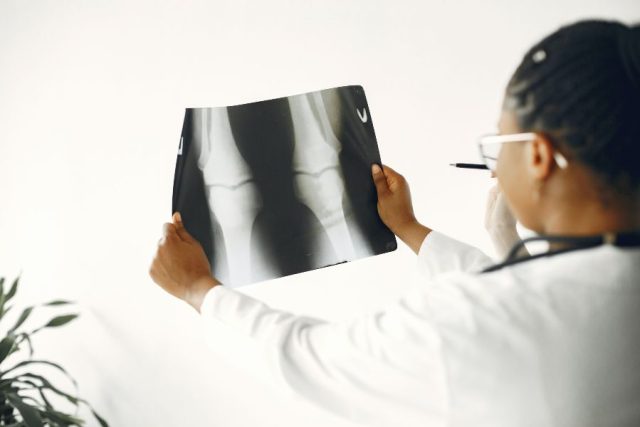Back pain can be incredibly uncomfortable, debilitating, and difficult to manage day after day. If you’re dealing with chronic back pain or the beginnings of a lower back injury, visiting an orthopedic doctor could potentially provide the answer—but is it right for everyone? In today’s blog post, we discuss considerations to make when deciding between a primary care physician and an orthopedic specialist if you are suffering from lower back discomfort, as well as potential treatments that could help ease your condition. Read on to learn more about whether seeing an orthopedic doctor might be right for you.
What Is An Orthopedic Doctor And What Do They Treat
When it comes to our bodies, few things are as important as our bones, muscles, and joints. That’s where orthopedic doctors come in. This type of specialist doctor specializes in diagnosing, treating, and preventing injuries and diseases of the musculoskeletal system. This includes everything from fractured bones to spinal deformities. In addition to treating these conditions with medicine and physical therapy, orthopedic doctors may also perform surgery to repair damaged or broken bones. They work closely with patients to develop personalized treatment plans that will not only relieve pain and discomfort but also help to improve their overall quality of life. Whether you’re an athlete with a sports injury or an aging adult with arthritis, an orthopedic doctor can provide the care and expertise you need to keep moving and living your life to the fullest.
When Should You See An Orthopedic Doctor For Back Pain
Although most cases of back pain can be treated with rest, ice, and over-the-counter pain medication, there are situations when it’s necessary to see an orthopedic doctor. If you experience back pain that radiates down your leg, weakness or numbness in your legs, sudden weight loss, or difficulty urinating, it’s important to seek the advice of an orthopedic doctor. Additionally, if your back pain lasts longer than a few weeks or is debilitating, you should make an appointment with an orthopedic specialist who can diagnose the underlying cause of your pain and recommend the appropriate treatment plan. Don’t ignore persistent back pain, as early intervention can lead to a faster and more complete recovery.
Common Tests And Procedures Used To Diagnose Back Pain
Understanding what tests and procedures are commonly used to diagnose back pain can help alleviate the discomfort. Typically, the first step is to undergo a physical examination, during which a healthcare professional will assess the range of motion, reflexes, and any affected areas of the back. If necessary, they may order imaging tests, such as X-rays, CT scans, or MRIs, to get a closer look at the bones, muscles, and tissues. Other diagnostic procedures that may be used include nerve conduction tests and discograms, which evaluate nerve and disc functionality, respectively. By undergoing these tests and procedures, a proper diagnosis can be made, and a treatment plan can be developed to help relieve back pain.
What To Expect During Your First Appointment And Treatment Plan
Starting a new treatment plan can be both exciting and nerve-wracking. During your first appointment, you can expect to meet with a healthcare professional who will guide you through the process and answer any questions you may have. They will likely ask you about your medical history, current symptoms, and lifestyle to get a better understanding of your overall health. From there, they will work with you to create a personalized treatment plan that is tailored to your unique needs and goals. This plan may include a combination of medications, therapies, and lifestyle changes that are designed to help you reach your optimal level of health and wellness. Don’t be afraid to speak up and ask questions during your appointment. It’s important to have a good understanding of your treatment plan so that you can feel confident and empowered in your journey towards better health.
Tips For Finding The Right Orthopedic Doctor For You
When it comes to finding the right orthopedic doctor, the process can seem overwhelming and confusing. You want to find someone who is not only highly qualified and experienced but also someone whom you feel comfortable with and can trust. One tip for finding the right orthopedic doctor is to start by asking for referrals from people you trust, such as your primary care physician, family members, or friends who have undergone similar treatments. Additionally, make sure to do thorough research and check the doctor’s credentials, education, and experience. Don’t be afraid to ask questions and interview several doctors before making a final decision. Remember that the most important aspect of choosing an orthopedic doctor is finding someone who understands your unique needs and can provide personalized care that meets your specific goals and lifestyle.
In conclusion, back pain can significantly impact your daily life and well-being, making it essential to consider seeking medical attention when dealing with persistent or severe discomfort. Orthopedic doctors specialize in diagnosing, treating, and preventing musculoskeletal conditions, making them valuable resources for addressing various back pain issues. While many cases of back pain can be managed with rest and over-the-counter medications, certain circumstances warrant a visit to an orthopedic specialist.
Back pain that exhibits specific symptoms such as radiating pain down the leg, numbness, weakness, unexplained weight loss, or difficulties with urination should prompt a consultation with an orthopedic doctor. If the pain persists beyond a few weeks or interferes with daily activities, seeking professional advice becomes crucial. Diagnostic tools like physical examinations, imaging tests, and other procedures can help pinpoint the underlying cause of your pain, enabling the formulation of an effective treatment plan.
Your initial appointment with an orthopedic doctor involves a comprehensive assessment of your medical history, symptoms, and lifestyle. This information forms the foundation for a personalized treatment plan that may incorporate medication, therapies, and lifestyle adjustments. Open communication during this process is key to understanding your treatment plan and feeling confident about your journey toward improved health.
Finding the right orthopedic doctor is pivotal to your recovery journey. Seek referrals from trusted sources, and research credentials, and interview potential doctors to ensure they align with your needs and preferences. Remember, your chosen orthopedic doctor should not only possess the necessary expertise but also provide compassionate care that respects your unique circumstances.
Ultimately, whether you decide to consult a primary care physician or an orthopedic specialist for your back pain depends on the severity and nature of your symptoms. Prioritizing your health and well-being by seeking appropriate medical attention can pave the way for effective management, relief, and an enhanced quality of life.














